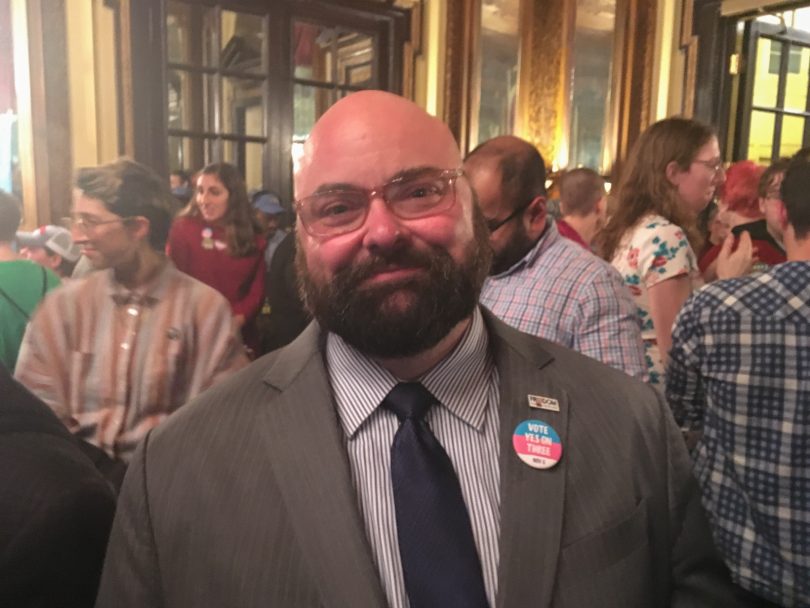By Geoffrey Line
BU News Service
BOSTON — A month has passed since citizens in Massachusetts overwhelmingly voted Yes on Question 3, a ballot measure posed in the Nov. 6 midterm elections to keep in place legislation that protects transgender people against discrimination in the state. Now that the legislation is secured and set to protect the rights of transgender people, advocates and allies of Boston’s trans community want to see new policies that protect the rights of trans people across the nation as well.
“It is the first statewide referendum on transgender rights in the commonwealth,” said Jason Wu, Executive Director of GLAD, GLBTQ Legal Advocates and Defenders. He wants its momentum to continue, “across the country, town by town, state by state.”
Damon Hainline, a political activist who temporarily relocated from Chicago to join the Massachusetts Yes On 3 campaign, agrees. “Massachusetts is setting a precedent,” he said. “The way things have been federally the last [couple of] years — state matters.”
Hainline referred to President Trump’s attempt to ban transgendered people from military service and transgendered children from using the restroom of their choosing in public schools under Title IX, civil rights law that protects those liberties. He cited an LGBTQ antidiscrimination bill passed in Illinois as an example of how state legislators can pass law that extends the rights of transgendered people, independently of federal government.
Such legislation is “desperately needed in thirty-one states without transgender protections in place,” according to Masen Davis, CEO of Freedom for All Americans, the bipartisan campaign to secure full non-discrimination protections for LGBTQ people nationwide. He is keen to see movements in states like Virginia, Ohio and Florida, and believes that he will.
“I think people are tired of the politics of division,” Davis said. “They’re tired of wedge issues and they want to see people come back together across the aisle and really share the values that we have as Americans.”
Familiarity is essential to that unity, according to Krina Patel, the Coalition Director of the Yes on 3 Ballot Campaign. “It’s all about knowing trans people. If you just know one person your whole view on this question changes,” Patel said. “We’ve met Republicans who support this issue because they know a transgendered person.”
Davis, from Freedom for All Americans, hopes such bipartisanship will result in a federal bill guaranteeing LGBTQ protections by the year 2025.
But not all desired measures are so sweeping. For Mateo Cox, a transgender man, new legislation is less important than policy that better educates medical professionals about trans healthcare.
Scout, a non-binary member of the Massachusetts Transgender Political Coalition who requested to omit their last name, would like to see driver’s licenses and other forms of government-issued identification that allow trans and non-binary people to specify the gender identity with which they most sincerely identify. It is a desire shared by many transgendered and non-binary people across the country who hold that their identities are invalidated or unseen if not made official in public documents, according to Mason Dunn of the Massachusetts Transgender Political Coalition.
Legality aside, supportive parents of transgender children, transgender teens, their LGBTQ and heterosexual allies alike want the American public to remove stigma attached to trans identities, according to Nicole Talbot, Jared Matas and a mother of a transgendered teenager who preferred to go by “Kathy.” (Her child, a national athlete, has been subject to bullying and ostracism for wanting to compete, since transitioning with players of his sincerely held gender identity.)
As Lindsey Dutton-Reid put it, Yes On 3 was a “campaign not just to win an election”— or influence social policy —“but to humanize trans people.”





